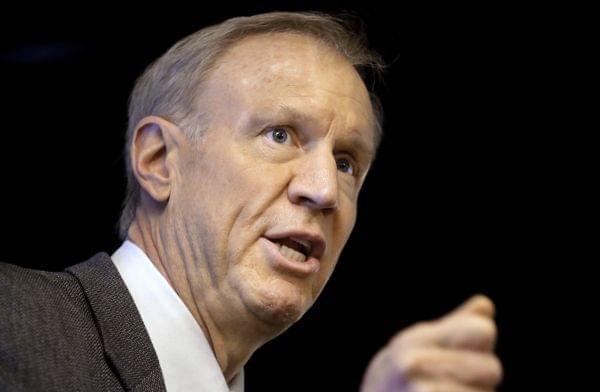What Sank Gov. Rauner’s ‘Turnaround Agenda’?

Gov. Bruce Rauner, pictured here in March, has encountered stiff resistance to his 'Turnaround Agenda.' (AP Photo/Seth Perlman)
As the Illinois General Assembly’s spring legislative session comes to a close, Gov. Bruce Rauner has failed to win passage of his "Turnaround Agenda." Brian Mackey has this assessment of three of the most common theories as to why.
The three theories can be summed up as: too late, too little and too much.
No. 1: too late. Why did Rauner wait until the last days of session to introduce legislation with his ideas?
The “Turnaround Agenda” came into this world shortly before noon on Feb. 4, when Rauner gave his State of the State address. Back then, it was a list of 44 bullet points. Fast forward through February, March, April and most of May, and Rauner narrowed that to a handful of ideas, like changing the worker’s compensation system, restricting lawsuits and freezing property taxes.
Those three proposals were given committee hearings in the Senate, where majority Democrats, like Sen. Ira Silverstein of Chicago, wondered: What took so long?
“It upsets me when I see an issue like this brought before us with four days … left to go before [the end of] session, where this could have been brought up (earlier)," Silverstein said. "Why now?"
Senate Republican Leader Christine Radogno says that’s a bogus argument.
“The fact of the matter is this is an issue that’s received a great deal of discussion," Radogno said. "There’s not a lot of surprise."
“I think that’s fair,” Sen. Kwame Raoul said. The Democratic chairman of the Judiciary Committee is conceding the point because Democrats are masters of last-minute lawmaking.
Theory No. 2: too little. In his quest to end the influence of the "special interests," did Rauner exclude too many people from negotiating his Turnaround Agenda?
Typically, interest groups work closely with lawmakers to reach compromises, like pro- and anti-gun activists, or mining and environmental groups. Rauner only wanted fellow politicians negotiating his ideas.
One of the governor's top aides, Richard Goldberg, lectured senators that this was by design.
“I know Gov. Rauner is not from Springfield. I’m not from Springfield. A lot of us are not from Springfield," Goldberg said. “That’s evident," a senator interjected. Goldberg continued: “And I have to say that the culture, the culture in springfield has to change, that lobbyists, status quo, should be in the room to write your legislation."
The voice interrupting Goldberg was that of Sen. Bill Haine, a Democrat from Alton. Like many in Springfield, he sees a legitimate role for lobbyists.
The argument goes: Legislation has consequences for lots of people. And those people ought to be able to mention those consequences to legislators.
“And you chose to ignore the age-old system of having legislators rely upon people to tell them the consequences," Haine said. "That’s your choice."
Radogno pointed out that lobbyists could and did make their views known through the legislators who were in the room. And come on — legislators, when they want to, can get things done alone. That big pension overhaul a couple years ago was the product of legislator-only meetings.
So Theory No. 2 — too little negotiation — isn’t the whole story.
'I don't pretend to believe that I'm going to negotiate you into becoming a Democrat, any more than I think you can negotiate me into becoming a Republican.'
Theory No. 3: too much. As in, what is he doing presenting a 44-point businessman’s dream agenda to a Democratic legislature? Of course they wouldn’t line up.
The Democratic brand is looking out for the downtrodden — they’re not going to vote to limit compensation for injured workers and accident victims.
And undermining labor unions — a key part of the Democratic base — why even ask?
But don’t take my word for it. Sen. Toi Hutchinson, a Democrat from Chicago Heights: “Now, there are a lot of negotiations that are happening in this building, but I don’t pretend to believe that I’m going to negotiate you into becoming a Democrat, any more than I think you can negotiate me into becoming a Republican."
Rauner tried to sail a corporate dream agenda through the rocks of a Democratic legislature. It should be no surprise that his Turnaround ship ran aground.
